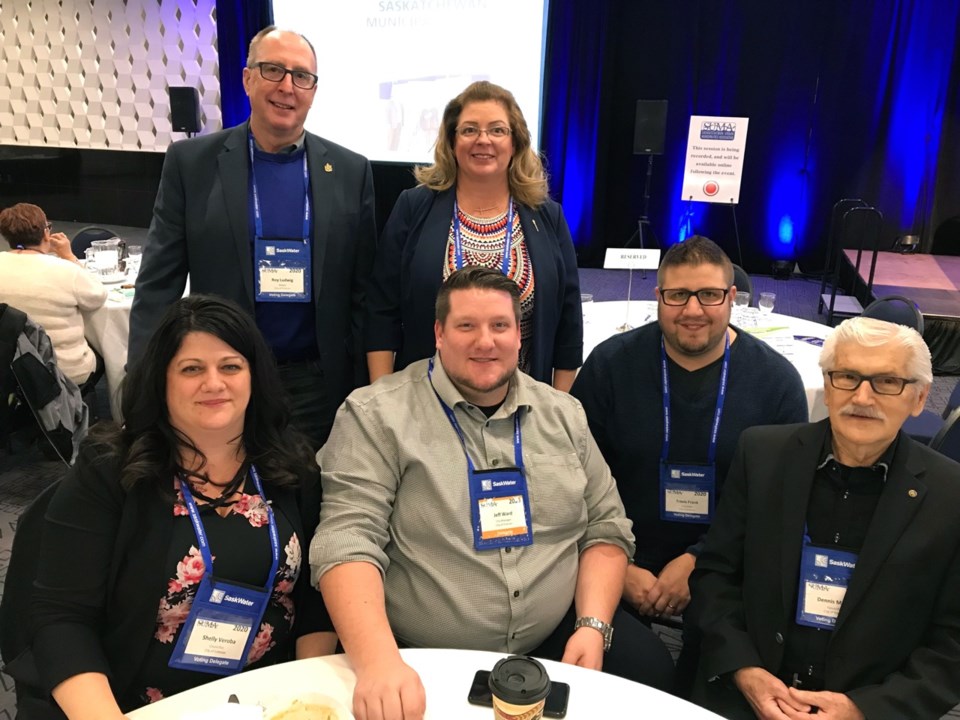Mayor of Estevan Roy Ludwig along with the city manager Jeff Ward and Councillors Shelly Veroba, Travis Frank and Denis Moore were in Regina last week to take part in Municipalities of Saskatchewan (former SUMA) convention. The Mercury talked to the mayor about the landmark developments of the busy four-day event.
At the convention, Saskatchewan Premier Scott Moe in his address announced that there will be more money coming towards municipalities. He promised an 11 per cent increase in revenue sharing.
“It was hopeful. He (also) said there will be more announcements coming,” said Ludwig.
The convention was a combination of speeches, education sessions and round tables. Leaders of communities had a chance to broaden their knowledge on emergency preparedness, cybercrime, co-operative purchasing, the foundation for reconciliation, clean energy, smart cities, waste, organics and plastics, constructing safe cities and more.
On the first day of the convention, the mayors’ caucus was held, where the leaders decided which initiatives they will be lobbying to the provincial government this year. There were 20 resolutions that came to the floor at the caucus.
Mayors passed a resolution on going back to previous SaskPower rates, which were discounted rates for municipal rank facilities. They also passed a resolution on SaskPower net metering program, advising to reconsider changes to the program and to make amendments to support clean energy developments. Besides, they passed a resolution suggesting the organization to have a seat at the provincial table when decisions affecting municipalities are being made. Another resolution that passed was that provincial sales tax on municipal construction projects should be rolled back.
The recommendation to supply funding for municipal climate change action centres was carried. Mayors also passed a resolution suggesting to reinstate the Dutch Elm disease program. Another resolution was on the education property tax collection fee.
“Right now we collect the education portion of the taxes on behalf of the schools and we don’t get anything for that. So they are asking to retain a percentage of education property taxes equal to what the Government of Saskatchewan retains for gas tax fund administration to compensate municipalities for the cost of leveeing, administering and remitting education property taxes on behalf of the government of Saskatchewan. That passed,” said Ludwig.
They also passed a resolution suggesting a partnership between the provincial government and economic development alliance to create programs with sustainable funding to assist municipalities in revitalizing their historic downtowns. Another resolution that went through was the uniform highway construction zones, advising to advocate the federal minister of transportation to harmonize all-nature highway construction zones to the same standard per each province. The resolution suggesting community involvement in health services in regards to recruitment and retention of specialists was also carried.
Another resolution suggested to inter-consolidate transfers, and that was carried. It recommends the Minister of Health to develop a program similar to the senior cab program for ambulance service, where once the patient has entered the healthcare system they get the care and treatment they need without incurring additional financial burdens.
They also passed a co-ordinated support for crystal meth crisis resolution, suggesting the provincial government work with communities to create interventions to break the cycle of addictions by improving co-ordination among provincial ministries, police services, community agencies and Indigenous organization to ensure an effective, evidence-based response that addresses all four pillars of the addiction crisis: prevention, treatment, enforcement and harm reduction. They also suggested to increase mental health addiction services funding by at least three per cent in the 2020 provincial budget.
Another resolution was a community health advisory network. It suggested to the Ministry of Health to ensure direct municipal input and involvement in the health system by creating a health community advisory network.
Another resolution that was passed addressed current problems with provincial transportation, requesting the creation of a reasonable and affordable type of transportation.
They also passed a resolution for leave for municipal council duties, suggesting that employees should be allowed to attend meetings such as conferences or training without a need to use their vacation days or long-term absence.
“All of these recommendations are to the province for them to act on, but… it will be up to them whether or not they agree to act on it or not. These all will be requests on behalf of our municipalities association to go to the government,” explained Ludwig.
Municipalities’ representatives also had numerous meetings with Saskatchewan ministers to discuss some problems they have to deal with and perspectives moving forward.
“We had our minister, Honorable Lori Carr. We had open discussions with her. And then Minister Duncan gave an open forum with the environment and answered questions. We had the highway Minister Greg Ottenbreit. And we also had Minister Gordon Wyant. They answered questions on the infrastructure of highways. Then we had Justice, Correction and Policing. We had minister Don Morgan and Minister Christine Tell. They were there with the policing and answered questions. And then we had Minister Jim Reiter on health and remote health,” said Ludwig.
Saskatchewan premier Scott Moe and most of the provincial ministers were in for an open question period during one of the days.
The mayor noted that outside of the busy schedule, they also dedicated a lot of time to networking.
“It was a good opportunity to network, to talk about common issues, common problems and maybe get some ideas on what other cities are doing that may be helpful, that maybe we could learn from and vice versa,” said Ludwig.



